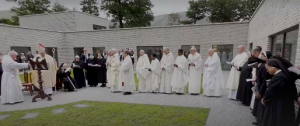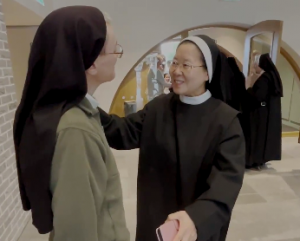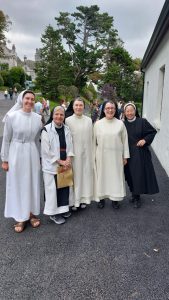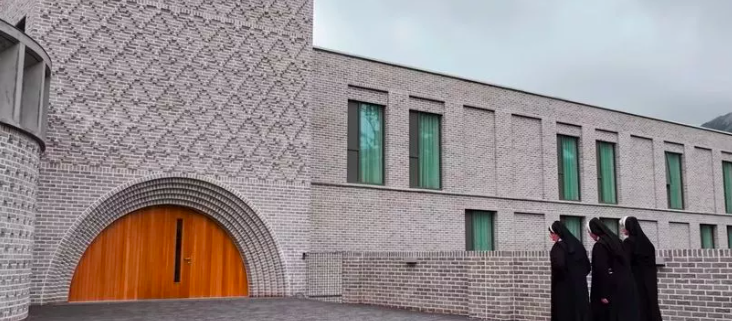A Visit to Kylemore Abbey
On Saturday 31st of August, Sisters Denise, Beatrice and Laura made their way from Glencairn to Kylemore Abbey to attend a celebration for Religious hosted by the Benedictine nuns to mark the opening of their newly built monastery.
A couple of weeks prior, Sisters Ann and Liz from Glencairn had attended the blessing of the new monastery at Kylemore, with great joy. So, there was much anticipation for the next visit! Both visits were  fruitful and inspiring occasions, and a reminder of what prayerful fidelity, courage and hope in the Lord can achieve.
fruitful and inspiring occasions, and a reminder of what prayerful fidelity, courage and hope in the Lord can achieve.
After celebrating Mass and a meal with the visiting Religious, Sisters Denise, Beatrice and Laura stayed for a meeting of the Association of the Monasteries of Ireland the following day. This meeting was attended by Dominicans, Redemptoristines and Benedictines. The theme of the meeting was ‘Monastic Hospitality’ and each community gave a short talk on this important theme as lived out in community and in contemplative life. Below is the talk Sr Beatrice presented on behalf of Glencairn:
I wanted to talk about hospitality in Glencairn through the lens of 3 biblical figures: Saints Martha, Mary and Lazarus―ever very beloved by the Cistercian order and celebrated on the same feast in the Cistercian sanctoral, even prior to the more recent changes to the General Roman Calendar. For this feast, they are described as ‘Hosts’ of the Lord, and I think that’s what we’re all trying to be when we offer hospitality to others, in whatever form it takes.
Beginning with Lazarus, the Gospel of John describes his coming out of the tomb at the word of Jesus, and the Lord saying to the crowd, “Unbind him and let him go.” So, not only is he raised, but the responsibility of his being freed falls on the community surrounding him. In this way, we too are called to receive each other, our sisters in community, and the stranger, meeting them in their brokenness and woundedness, and being a place for them to be ‘unbound.’
We are all bound and fettered by different things: responsibilities, suffering, pain. We are wrapped constantly in those same “strips of cloth” that wrapped Lazarus, strips either of our own making or because of others’ insensitiveness. With the story of Lazarus, we are being told that giving and receiving hospitality can raise us to new life.
This is the hospitality of Christ: we are healed in God’s action by self-surrender and self-gift. In a monastic community, we are stretched and challenged to reveal our wounds and to be unbound. Only by being liberated from sin and woundedness can I act with integrity and be clothed, not in ‘strips of cloth’, but ‘with dignity’.
The 2021 decree joining these three saints together into one feast describes Martha as “generously offering Christ hospitality.” The interesting thing about Martha, her example of hospitality and her proclamation of faith, is that she also receives a reprimand. Maybe this is where we can most identify with her (or maybe I should say where I most identify with her!). Guests can often bring out the best in us. We see everything good in them and feel good ourselves. The challenge is to do that for those with whom we live, whose infractions can be the pinpricks of our daily lives. Martha was ready to welcome Jesus, but not her sister, Mary. However, the honour shown to guests belongs to our sisters too. To limit hospitality to the function of the guest mistress, or to moments when we are called upon to welcome someone from outside is too narrow.
Yet, Martha’s hospitality goes further, in her proclamation of who Jesus is. “I believe that you are the Christ, the Son of God, who is coming into the world.’” This is the sometimes the crux of our hospitality: our bearing Christ for others, our declaration of who he is. In our guest house, I think that’s what we’re trying to do. Not in a dogmatic or trumpeting way, but by quietly going about our monastic day, being faithful to the call of Christ when the bell goes for the Divine Office, being attentive to the needs of guests, but not to the detriment of our monastic values, or our monastic solitude.
This is what Martha exemplifies, the archetype of what St Benedict is asking, “I was a stranger and you welcomed me” (Mt; RB 38). St Benedict is clear in his teaching that the guest is to be received as Christ. She is also serving her guest, which reminds me of the washing of the feet, the Mandatum, and St Benedict’s exhortation to the Abbot to wash the feet of the guests. John Paul II described this hospitality of the washing of the feet as a manifestation of a readiness to “transform the world and to restore it to the Father. The world is transformed by love. To wash someone’s feet is to serve. To wash someone’s feet then, is to transform the world.”
I am reminded too, of the Benedictine/Cistercian hospitality offered between the women saints of our orders, especially in medieval times: Ida, Gertrude, Beatrice, Hadewjich. Mystics often felt that their close relationship with God allowed them to “send” God’s presence or grace to others, especially those with whom they shared a spiritual bond. The mystics believed that through prayer, they could ask God to be present with someone else, thus “sending God” to that person. This reflects the deep sense of hospitality in the spiritual life, where one person’s prayers invoke divine assistance for another. It’s a poetic way of describing how these holy individuals supported each other’s spiritual lives by invoking God’s presence and grace for one another through prayer and shared experiences.
present with someone else, thus “sending God” to that person. This reflects the deep sense of hospitality in the spiritual life, where one person’s prayers invoke divine assistance for another. It’s a poetic way of describing how these holy individuals supported each other’s spiritual lives by invoking God’s presence and grace for one another through prayer and shared experiences.
Thirdly, we can look to Mary of Bethany, she who is said to have ‘listened attentively to his words,’ she who had ‘chosen the better part.’ Listening is a profound form of hospitality. But, also, we can look at Mary’s prompt meeting of the Lord. John’s Gospel tells us that when Martha told Mary that the Master was calling for her, ”She rose quickly and went to him.” I don’t know if we can truly say that we offer that beautiful promptness of hospitality. Our Cistercian Constitutions say that “only if the sisters prefer nothing whatever to Christ will they be happy to persevere in a life that is ordinary, obscure and laborious,” and so, we see from Mary how to prefer nothing to Christ and know what our disposition towards those around us is; to listen, as she did to her sister, but with her attention ultimately on the Lord. It is probably too easy to forget this with the demands of hospitality that we meet everyday in the monastery, in the guesthouse or with visiting Religious or friends, we try to see Christ in the stranger, but also not to take our eyes off him.
“Whoever does the will of God, he is my brother and sister and mother.” But as St Benedict reminds, if we wish to dwell in this Kingdom, we need to ‘fulfil the obligations of those who live there,’ we need to love. Before Jesus departed to go and take his place at his Father’s right hand, he said: “just as I have loved you, you also are to love one another.” We are called to believe that in Christ we are all reconciled, this is the promise we are made and the hospitality we espouse.



